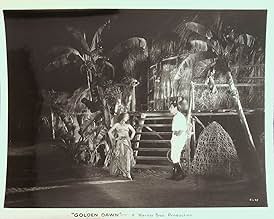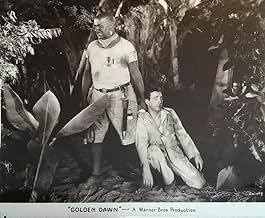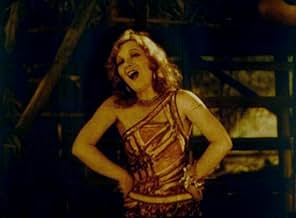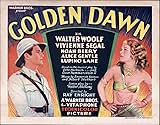Aggiungi una trama nella tua lingua"Golden Dawn" is a musical operetta released by Warner Brothers, photographed entirely in Technicolor, and starring Walter Woolf King and Noah Beery. The film is based on the semi-hit stage ... Leggi tutto"Golden Dawn" is a musical operetta released by Warner Brothers, photographed entirely in Technicolor, and starring Walter Woolf King and Noah Beery. The film is based on the semi-hit stage musical of the same name by Oscar Hammerstein II and Otto Harbach."Golden Dawn" is a musical operetta released by Warner Brothers, photographed entirely in Technicolor, and starring Walter Woolf King and Noah Beery. The film is based on the semi-hit stage musical of the same name by Oscar Hammerstein II and Otto Harbach.
- Regia
- Sceneggiatura
- Star
- Tom Allen
- (as Walter Woolf)
- Piper
- (as Sojin)
- Secondary Supporting Role
- (non citato nei titoli originali)
- Hasmali - the Witch Doctor
- (non citato nei titoli originali)
- Napoli
- (non citato nei titoli originali)
- Secondary Supporting Role
- (non citato nei titoli originali)
- Secondary Supporting Role
- (non citato nei titoli originali)
Recensioni in evidenza
Believe me, I can see why people would give this a low rating. But if you're into saying "Huh?" and wondering what people were thinking when they were creating something...this is for you.
Not intentionally, though.
It's an operetta set at a camp for English prisoners being held by the Germans somewhere in the African jungle. There are dozens of native extras, all of them black actors, whose main function in the story is to prostrate themselves toward whichever white lead happens to be singing in the vicinity.
And yes, all of the lead actors are white, a little awkward since many of them are playing natives of the same tribe as the actually black extras. Their skin tones range from burnt cork (Noah Beery) to snow white (the golden Dawn herself). The plot revolves around whether the obviously white Dawn is really black. I can't tell you how it comes out -- that would be a spoiler.
Dawn's mother, a slightly darker shade of makeup, wears earrings and pearls and sort of resembles Margaret Dumont.
Speaking of whom, the male lead is played by Walter Woolf, who, as Walter Woolf King, plays the villain tenor Rodolfo Lassparri in "A Night At The Opera." When this, uh, dawned on me, I actually shouted out, just like Groucho as Otis B. Driftwood, "Lassparri?!?!?!"
This is racism too ridiculous to be objectionable. Instead, like the (intentional) loony racial stereotypes in "Blazing Saddles," it's hysterical.
Noah Beery (brother of Wallace, father of Jr.) plays Shep Keyes, who speaks and sings in an exaggerated stereotypical southern black dialect, full of "gwines" and so on. Is he supposed to be American? African? No idea. Then there's the native second female lead character, apparently (made up to be) African, but doing the same shufflin' accent as Beery. Is it just me, or does she bear a startling resemblance to Andrea Martin?
There are so many little delights, other absurd characters and "comic" subplots, moments to cherish. The Whip song! My Bwana! A Tigah! The final, shocking, revelations! Why are you reading this? Go forth, do whatever it takes to find a copy of this movie, and watch it!
All that said, it's a rare chance to see the great stage star Vivienne Segal in a lead, and the famous British comic Lupino Lane do a fun eccentric dance. The Kalman score is quite pretty, too, if you can tune out the lyrics. But unless you're a connoisseur of operetta or a lover of grotesquely bad movies, the whole thing is just about unwatchable.
Inconsistencies and absurdities abound, the most flagrant being the portrayal of a native go- between by Noah Beery in blackface and a ridiculously inappropriate Stepin Fetchit accent; among the most straight-out entertaining sequences are songs added for the film version: "We Two" sung winningly by ace music hall veteran Dick Henderson with Marion Byron. Byron also delights with "A Tiger" – another jazzy number which she milks to the last drop of her pint-sized self. The other, slower songs which came from the stage original ("My Bwana," "Dawn," and "Mooda's Song") fare less well and are harder to understand, despite the fine voices of Segal, leading man Walter Woolf and Alice Gentle as Segal's "mother." Lupino Lane does some astounding acrobatics for "In a Jungle Bungalow." This is not the only bad musical film he enlivened.
The campiest moments occur during the climax when the white girl is about to be married to Mulungu by a bug-eyed, blacked-up witch doctor (Nigel de Brulier) who delivers his lines like a 19th century Shakespearean ham. The rock-bottom melodramatics are so over the top by the time you get to the atrociously dubbed finale, nothing matters any more. You can either goof on it or shrug, be grateful that those days are over, and move on to something more edifying. All in all, a fun fest for parties of musical theatre/musical film aficionados. This movie is to musicals what "Plan Nine from Outer Space" is to science fiction.
Lo sapevi?
- QuizThe Technicolor version is apparently lost; only the black and white version survives.
- BlooperComposer Herbert Stothart is billed as "Hubert" in the opening credits.
- Colonne sonoreAfrica Smiles No More
(1930) (uncredited)
Music by Harry Akst
Lyrics by Grant Clarke
Sung by Alice Gentle
I più visti
Dettagli
- Data di uscita
- Paese di origine
- Lingua
- Celebre anche come
- Aurora dorada
- Luoghi delle riprese
- Azienda produttrice
- Vedi altri crediti dell’azienda su IMDbPro
- Tempo di esecuzione1 ora 21 minuti
- Colore
- Color(2-strip Technicolor, original print)
Contribuisci a questa pagina



















